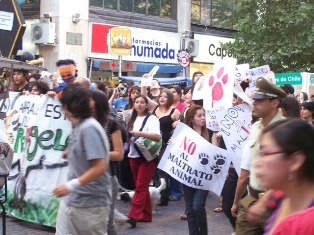Unit 15 Introduction
Reading: Chapter 16 in Macionis, pp. 481 - 511
In Unit 15, we continue studying social change, and look more directly at how people can influence social change through involvement with social movements. There are a variety of factors that influence social change, including technology, demography, culture, conflict and disaster. But one of the most interesting ways that societies change is when people take it upon themselves to do something to make things different. When they group together for these purposes, they form a social movement.
 Fig. 15-1: Animal Rights Protest, Santiago, Chile |
Through studies of various historical and contemporary social movements, sociologists have developed theories that explain how these organizations form and operate, as well as practical recommendations about how to institute social change through social movements.
Unit 15 also covers large scale social change, offering various explanations for the transition from agrarian to industrial (modern) society, as well as transitions from modern society to a globalized, post-modern world. Sociology as a discipline emerged along with industrialization, as thinkers tried to develop explanations for the new types of relationships and structures that were emerging in industrialized areas. Some see social change as a linear process, for example, production progresses from an agrarian setting based on community ties to an industrial setting based on instrumental ties. Others see social change as a contingent process, in other words, decisions establish conditions that lead change down a particular path. Still others argue that social change is a dialectic process, which means that all positive actions have negative, often unintended, consequences, and as time goes by the negative side increasingly asserts itself until there is a need to resolve the inherent conflicts built into the system, and a synthesis is achieved. The synthesis then becomes the new positive action, which produces its own structural opposite, continuing an endless cycle.